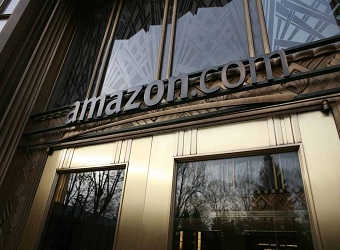Amazon has almost perfected speedy delivery to your home. Now the company is working to make sure your packages get inside the front door, or even into your car.
The company is in advanced talks to forge a partnership with Phrame, a maker of smart license plates that allow items to be delivered to a car’s trunk, according to a person with knowledge of the potential deal. Phrame’s product fits around a license plate and contains a secure box that holds the keys to the car. Users unlock the box with their smartphone, and can grant access to others, such as delivery drivers, remotely.
At the same time, Amazon is developing a smart doorbell device that would give delivery drivers one-time access to a person’s home to drop off items, said two people familiar with the matter. The sources asked not to be named because the discussions are confidential.
The new initiatives are part of Amazon’s effort to go beyond convenience and fix problems associated with unattended delivery. As more consumers shop online and have their packages shipped to their homes, valuable items are often left unattended for hours.
Web retailers are dealing with products getting damaged by bad weather as well as the rise of so-called porch pirates, who steal items from doorsteps. Amazon also has an incentive to reduce the number of lost packages, as they can be costly.
“Unattended delivery is the least desirable of last-mile fulfillment options as it leaves the package exposed to all kinds of risk,” said Natalie Berg, an analyst at Planet Retail RNG. “It’s not just the financial cost but also the impact that a failed delivery can have on brand reputation and customer loyalty. Nothing makes shoppers more irate than missing a delivery.”
Amazon, UPS and other delivery companies don’t disclose data on lost packages. But according to the smart doorbell maker August, 11 million U.S. homeowners had a package stolen in 2016, and a survey by Shorr Packaging showed 31 percent of U.S. shoppers have experienced package theft.
Videos of package theft are all over the internet. In one instance, a UPS delivery person was caught on camera stealing a FedEx package sitting in front of a house. In August, the U.S. Postal Service suspended deliveries on the south side of Milwaukee after a series of package thefts in the area.
While we didn’t get specific details of the potential Phrame partnership or the smart doorbell, both would likely offer a way for delivery people to drop off items using a temporary code. Phrame products could possibly be offered to Prime members for free, making in-trunk delivery available to Amazon’s most frequent shoppers, a source said. Another source said the doorbell could be used for grocery delivery. The Financial Times previously reported on a similar product.
Phrame declined to comment for this story. Amazon also declined to comment.
Amazon has sought a number of different options to reduce unattended delivery. Amazon Lockers have opened in more than 2,000 locations to give customers a safe pick-up spot for packages. The company also has a locker service called The Hub for residential apartment buildings.
Most recently, Amazon rolled out “Photo on Delivery,” a service that sends a photo of your delivered package to your phone.
Amazon has also previously experimented with in-trunk delivery. In 2015, it ran a pilot program for Audi owners in Germany, and the following year tested a service with DHL and Daimler in the same region.
Unattended deliveries have become such a headache in recent years that a new industry has emerged around package protection. Smart doorbell maker Ring lets homeowners monitor their front porch, and Mail Haven makes smart mail boxes to protect packages. Last month, Wal-Mart announced an in-home delivery service in partnership with smart doorbell maker August.
Michael Grabham is the founder of Package Guard, an alarm device that alerts consumers and their neighbors to package theft. He said that package theft is likely to get worse because it’s a quick and easy crime to commit.
“There will be more technology solutions that emerge to solve this problem as the problem grows,” he said.
Source: CNBC


